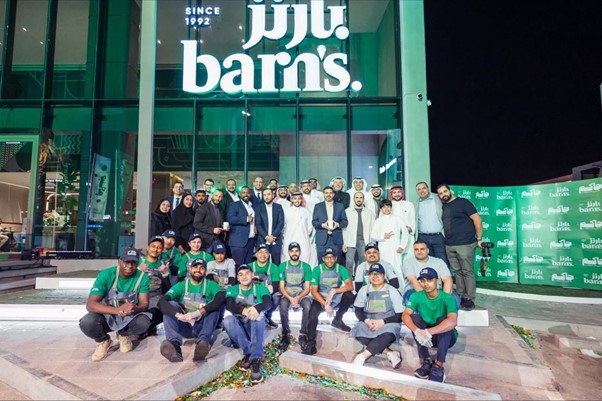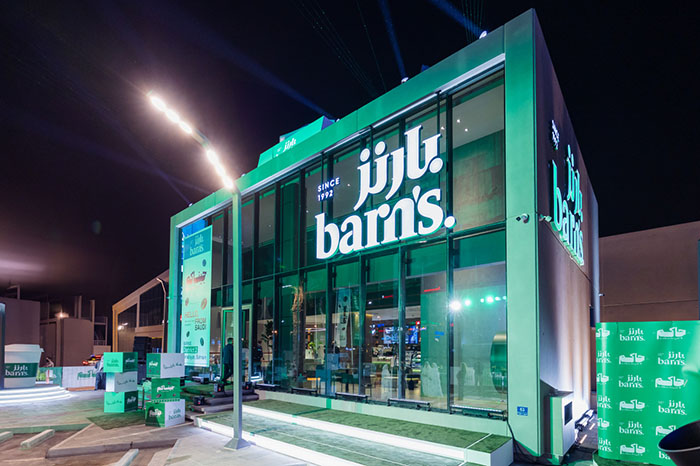
Saudi Based Barns Cafe, a burgeoning powerhouse in the coffee industry founded by the Al-Amjaad Group in 1992, is on the brink of a significant milestone. With the inauguration of its flagship international outlet in Bahrain, Mohamed Al Zain, the visionary at the helm, unveiled plans to expand the chain to 800 outlets by 2024 and set a goal of achieving 1,000 outlets before 2030. Currently operating over 740 outlets, Barns Cafe is eyeing North African city of Cairo for its next strategic launch this year.
The expansion strategy of Barns Cafe is not merely focused on increasing their numerical presence but also on widening their geographical and cultural footprint. The chain plans to establish a presence in ten new countries, spreading across Euro-American, Pan-Asian, and additional Arab regions. The overarching aim is to tap into the lucrative global halal market, with aspirations to become the leading halal cafe chain worldwide.
Mohamed Al Zain’s strategic blueprint for Barns Cafe goes beyond mere expansion; it integrates a profound respect for cultural diversity with effective market penetration tactics. This dual approach demonstrates a sophisticated understanding of the diverse consumer base and the complex dynamics of global commerce in today’s food and beverage industry.
As Barns Cafe in its 32th year of operation, stands on the cusp of redefining industry standards. The upcoming expansion is more than a celebration of past achievements—it’s a launching pad for future endeavors aimed at securing a dominant position in the global market.

The strategy for international expansion involves franchise networking ,careful market analysis and partnerships, aiming to create localized experiences under a global brand umbrella. This method ensures that each new outlet is not only a part of the global network but also a bespoke fit for its local market, reflecting regional tastes and preferences.
Moreover, Barns Cafe’s commitment to the halal market is not just about expanding consumer base but also about enhancing brand integrity and trust, particularly among halal consumers worldwide. This focus on halal certification underscores the brand’s commitment to quality and adherence to ethical standards in food production and service.
In addition to geographic and market expansion, technological innovation plays a crucial role in Barns Cafe’s strategy. The incorporation of advanced digital tools and services aims to streamline operations, enhance customer experiences, and bolster the brand’s competitive edge in fast-paced international markets.

Sustainability is another key facet of the expansion plan. Barns Cafe is dedicated to adopting environmentally friendly practices in its operations, contributing to the global efforts against climate change and reinforcing its commitment to corporate social responsibility.
Employee training and development also remain central to Barns Cafe’s operational strategy. As the chain expands, investing in human capital to uphold service excellence across all locations is paramount. This includes comprehensive training programs that emphasize customer service, operational efficiency, and cultural sensitivity.
Finally, as Barns Cafe expands its global footprint, community engagement and local collaborations will be essential. By partnering with local businesses and engaging in community activities, Barns Cafe aims to build strong relationships within new markets, fostering a sense of community and belonging.
Through strategic expansion, commitment to quality, and a deep understanding of the global market, Barns Cafe is poised to redefine the international coffee shop experience, promising exciting times ahead for coffee enthusiasts around the world.
The Arab coffee market is poised for significant growth, with a projected compound annual growth rate (CAGR) of approximately 7.5% leading up to 2028. This surge is fueled by a growing café culture and a heightened interest in premium coffee products among younger populations across the region. Economic improvements and increased urbanization are also contributing factors, driving demand for both traditional and specialty coffee variations in bustling metropolitan areas and beyond.






